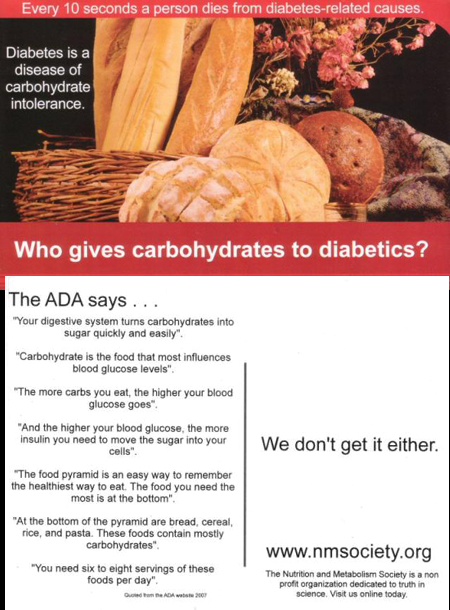+1000. It's so simple, and they keep getting it so wrong! There couldn't be something influencing these decisions, could there? *cough money cough*
Must be.
But I think there are several issues:
1. Treating the symptom blood sugar, instead of the cause - hyperinsulinemia. If chronic high insulin levels are the cause of diabetes, then giving a diabetic insulin is like fighting fire with more fire. That’s why type 2 diabetes is called a “chronic and progressive disease”. Because standard of care is to only treat blood sugar levels which does not cure the problem. Doctors have mostly been educated to treat the blood sugar, even though lowering blood sugar by medications such as insulin which just forces blood sugar into other tissues, has not been shown to improve long-term diabetic complications such as eye problems, wounds, neuropathy, kidney and liver problems.
2. Extreme fear of fat in western medicine caused by misguided (and wrong) dietary guidelines. Because diabetics are far more likely to suffer from heart disease they are often counseled to eat a supposedly heart friendly low fat diet which is thus high carb. Even though it’s the high carb intake that got them into this condition in the first place. Whereas a high fat low-carb diet will make both their blood sugar and insulin levels drop and reverse the disease in most cases.
3. Yes, there is tons of money to be made off of diabetics stuck in the standard of care that guarantees a chronic and progressive disease that gets increasingly more expensive to treat. Diet can reverse this expensive disease, yet who makes money off of that? Nobody except maybe some select food companies.
It does astound me that even though it has been known, and shown via several methods since 2008, that type 2 diabetes can be reversed in most cases, i.e. getting a patient below diabetic blood sugar levels and off most if not all diabetes medications. Yet here we are over 10 years later with the same general standard of care mostly focused on medications. Treatment by diet has made inroads, but they are tiny. It’s like there is this massive inertia and little motivation to change the status quo. Doctors and scientists making inroads are very aggressive with publishing their impressive results in medical and scientific journals, yet so much seems to be ignored. It’s just not moving into the mainstream.
Note that Swiss Re, one of the worlds largest life reinsurance companies, has started to be very vocal about low carb for health (longevity). At some point the many governments struggling under the staggering costs due to the diabetes epidemic are going to start cracking down. They have to. They can’t afford the current treatment that doesn’t improve patient’s health but instead worsens it.
http://foodmed.net/2018/07/swiss-re-type-2-diabetes-reversal-lchf/
